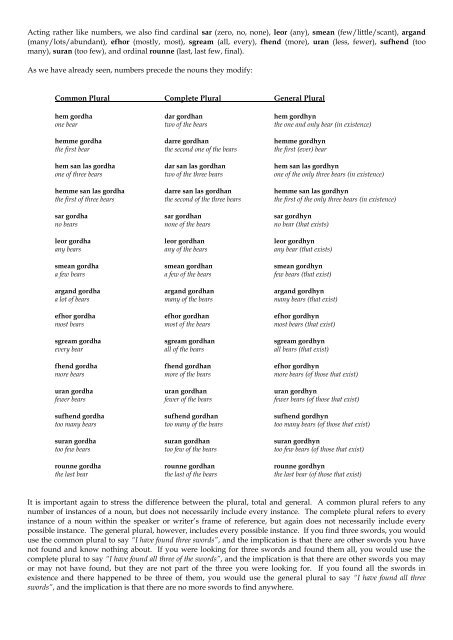You also want an ePaper? Increase the reach of your titles
YUMPU automatically turns print PDFs into web optimized ePapers that Google loves.
Acting rather like numbers, we also find cardinal sar (zero, no, none), leor (any), smean (few/little/scant), argand<br />
(many/lots/abundant), efhor (mostly, most), sgream (all, every), fhend (more), uran (less, fewer), sufhend (too<br />
many), suran (too few), and ordinal rounne (last, last few, final).<br />
As we have already seen, numbers precede the nouns they modify:<br />
Common Plural Complete Plural General Plural<br />
hem gordha dar gordhan hem gordhyn<br />
one bear two of the bears the one and only bear (in existence)<br />
hemme gordha darre gordhan hemme gordhyn<br />
the first bear the second one of the bears the first (ever) bear<br />
hem san las gordha dar san las gordhan hem san las gordhyn<br />
one of three bears two of the three bears one of the only three bears (in existence)<br />
hemme san las gordha darre san las gordhan hemme san las gordhyn<br />
the first of three bears the second of the three bears the first of the only three bears (in existence)<br />
sar gordha sar gordhan sar gordhyn<br />
no bears none of the bears no bear (that exists)<br />
leor gordha leor gordhan leor gordhyn<br />
any bears any of the bears any bear (that exists)<br />
smean gordha smean gordhan smean gordhyn<br />
a few bears a few of the bears few bears (that exist)<br />
argand gordha argand gordhan argand gordhyn<br />
a lot of bears many of the bears many bears (that exist)<br />
efhor gordha efhor gordhan efhor gordhyn<br />
most bears most of the bears most bears (that exist)<br />
sgream gordha sgream gordhan sgream gordhyn<br />
every bear all of the bears all bears (that exist)<br />
fhend gordha fhend gordhan efhor gordhyn<br />
more bears more of the bears more bears (of those that exist)<br />
uran gordha uran gordhan uran gordhyn<br />
fewer bears fewer of the bears fewer bears (of those that exist)<br />
sufhend gordha sufhend gordhan sufhend gordhyn<br />
too many bears too many of the bears too many bears (of those that exist)<br />
suran gordha suran gordhan suran gordhyn<br />
too few bears too few of the bears too few bears (of those that exist)<br />
rounne gordha rounne gordhan rounne gordhyn<br />
the last bear the last of the bears the last bear (of those that exist)<br />
It is important again to stress the difference between the plural, total and general. A common plural refers to any<br />
number of instances of a noun, but does not necessarily include every instance. The complete plural refers to every<br />
instance of a noun within the speaker or writer’s frame of reference, but again does not necessarily include every<br />
possible instance. The general plural, however, includes every possible instance. If you find three swords, you would<br />
use the common plural to say “I have found three swords”, and the implication is that there are other swords you have<br />
not found and know nothing about. If you were looking for three swords and found them all, you would use the<br />
complete plural to say “I have found all three of the swords”, and the implication is that there are other swords you may<br />
or may not have found, but they are not part of the three you were looking for. If you found all the swords in<br />
existence and there happened to be three of them, you would use the general plural to say “I have found all three<br />
swords”, and the implication is that there are no more swords to find anywhere.


